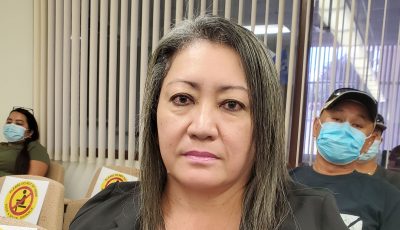9TH CIRCUIT AFFIRMS MANGLONA’S RULING
‘Non-NMDs can vote on Art. 12’
The U.S. Court of Appeals for the Ninth Circuit affirmed yesterday the 2014 landmark decision of U.S. District Court for the NMI Chief Judge Ramona V. Manglona, who ruled that qualified voters who are not of Northern Marianas descent must have the opportunity to vote on Article 12 initiative and any other initiatives to amend Article 12.
In a 17-page opinion, the Ninth Circuit held that the voter restriction in Article 18, section 5(c) of the CNMI Constitution is race-based and violates the 15th Amendment.
The 15th Amendment establishes that “the right of citizens of the United States to vote shall not be denied or abridged by the United States or by any state on account of race, color, or previous condition of servitude.”
The Ninth Circuit noted that the voting restriction in Article 18, Section 5(c) would divide the CNMI citizenry between NMDs and non-NMDs when voting on amendments to a property restriction that affects everyone.
The Ninth Circuit determined that the 15th Amendment “aims to prevent precisely this sort of division in voting.”
Ninth Circuit Chief Judge Sidney R. Thomas penned the opinion. Circuit judges Consuelo M. Callahan and Mary H. Murguia concurred with Thomas.
The Ninth Circuit judges said that Article 12, Section 4 of the CNMI Constitution contains a race-based definition of NMD. By restricting voting on the basis of this definition, Article 18, Section 5(c) enacts a race-based restriction on voting, the judges said.
Article 18, Section 5(c) thus violates the 15th Amendment, they said.
The Ninth Circuit judges said Manglona was correct to enjoin its enforcement.
In a 51-page decision issued in May 2014, Manglona ruled that Northern Marianas descent, as defined in Section 4 of Article 12 of the CNMI Constitution, is a racial classification, and under federal law it may not serve as the basis for preventing otherwise qualified voters from voting on proposed amendments to Article 12.
“Even if Northern Marianas descent were not a racial classification, it would be unconstitutional to deny non-NMDs the right to vote on Article 12 initiatives because the restriction is not narrowly tailored to achieve a compelling state purpose,” Manglona said.
Manglona issued the ruling in favor of John H. Davis Jr., a registered CNMI voter who, through counsel Jeanne H. Rayphand, sued the Commonwealth Election Commission, its chairperson and executive director, and then-governor Eloy S. Inos in his desire to vote on any initiative to amend Article 12.
Article 12 restricts the acquisition of permanent and long-term interests in real property to persons of NMD.
Article 18 Section 5(c) prohibits qualified voters who are not NMDs from voting on Article 12 initiatives.
CEC and co-defendants, through the Office of the Attorney General, appealed Manglona’s ruling to the Ninth Circuit.
During the pendency of the appeal, the CNMI government sought to enjoin counting of ballots cast in the November 2014 special election. The Ninth Circuit denied the request pending presentation of the motion to the district court. Manglona did not grant the injunction.
The election was held on Nov. 4, 2014. With both NMDs and non-NMDs eligible to vote, a majority of CNMI voters ratified Legislative Initiative 18-1.
Legislative Initiative 18-1 amended the definition of NMD in Article 12, section 4 by altering the required amount of “Northern Marianas Chamorro or Northern Marianas Carolinian blood” to qualify as an NMD from “one quarter” to “some.” It also removed NMD status from adopted children who would not otherwise qualify as NMDs.
It established a court procedure for people with less than “one quarter Northern Marianas Chamorro or Northern Marianas Carolinian blood” to attain legal NMD status.
At the Ninth Circuit hearing, assistant attorney general Charles Edmond Brasington argued for CEC and co-defendants. Rayphand argued for Davis.



























